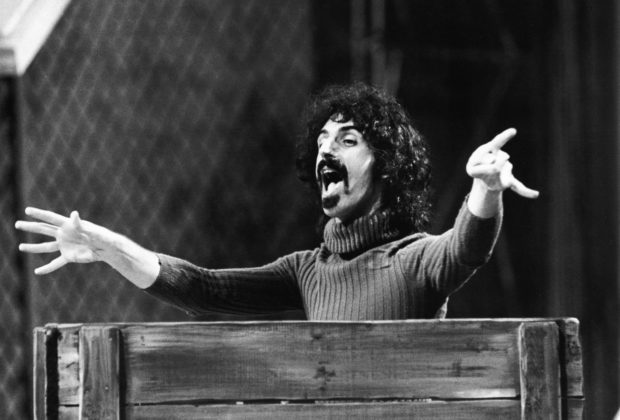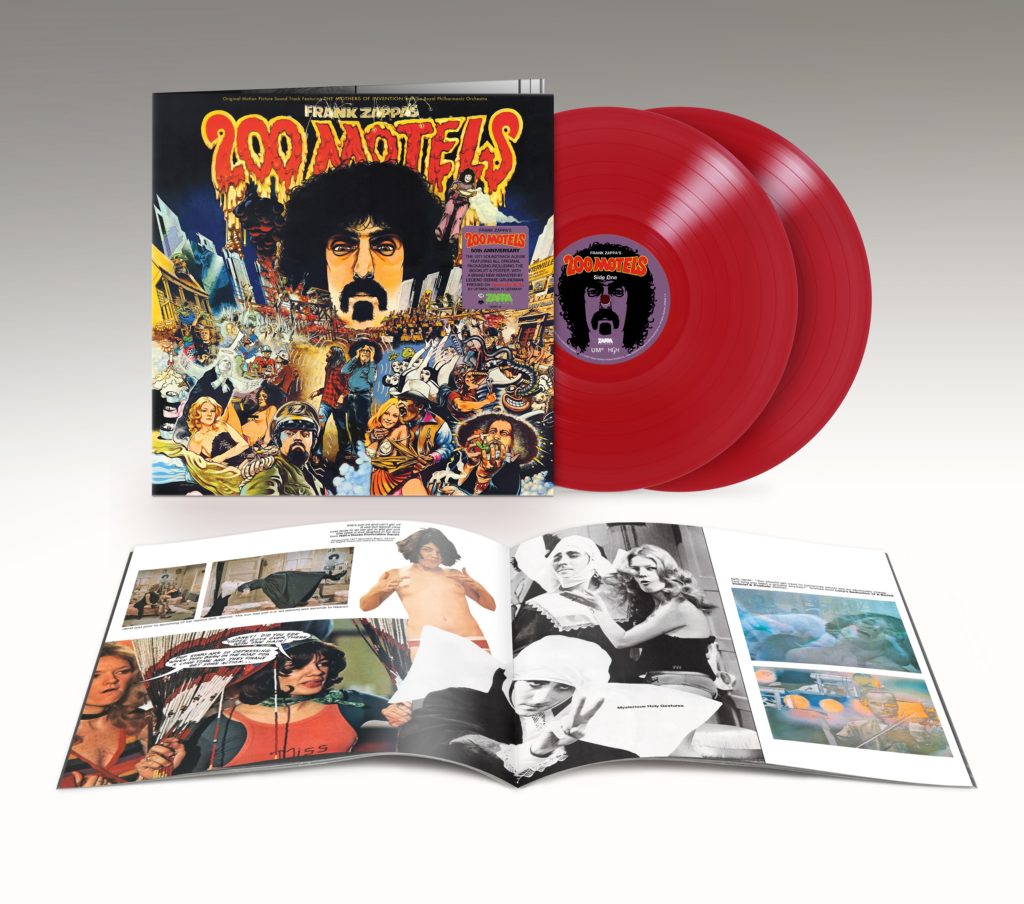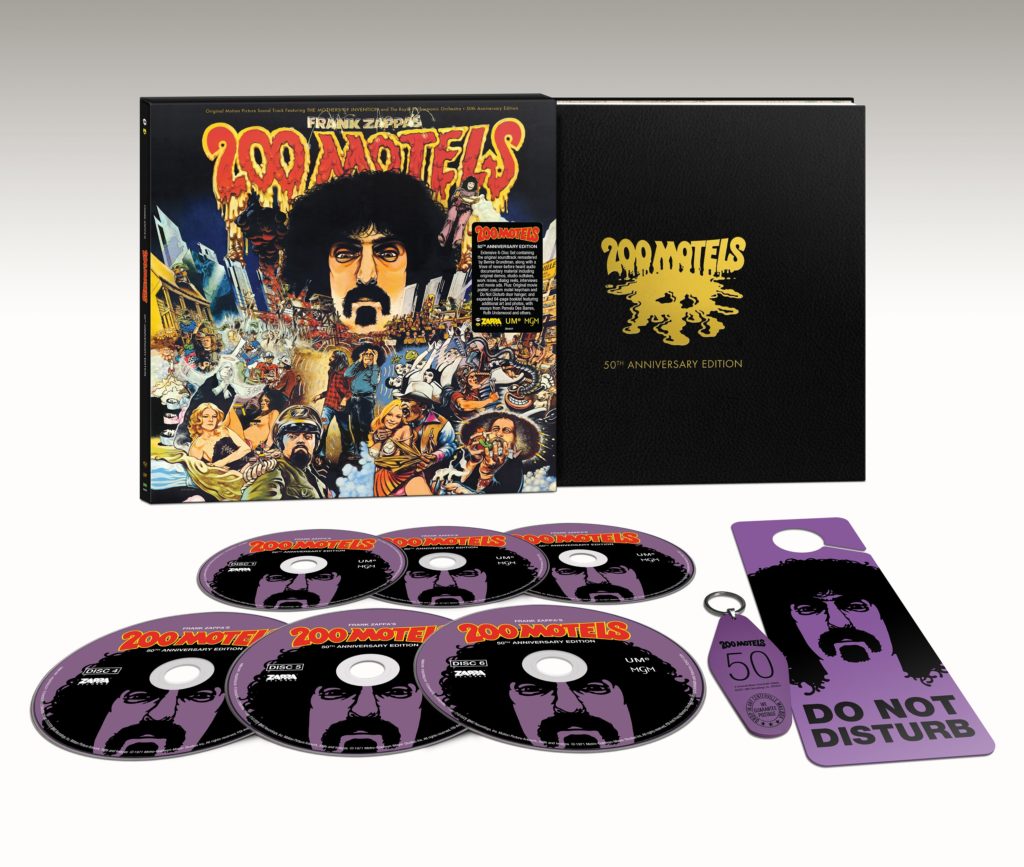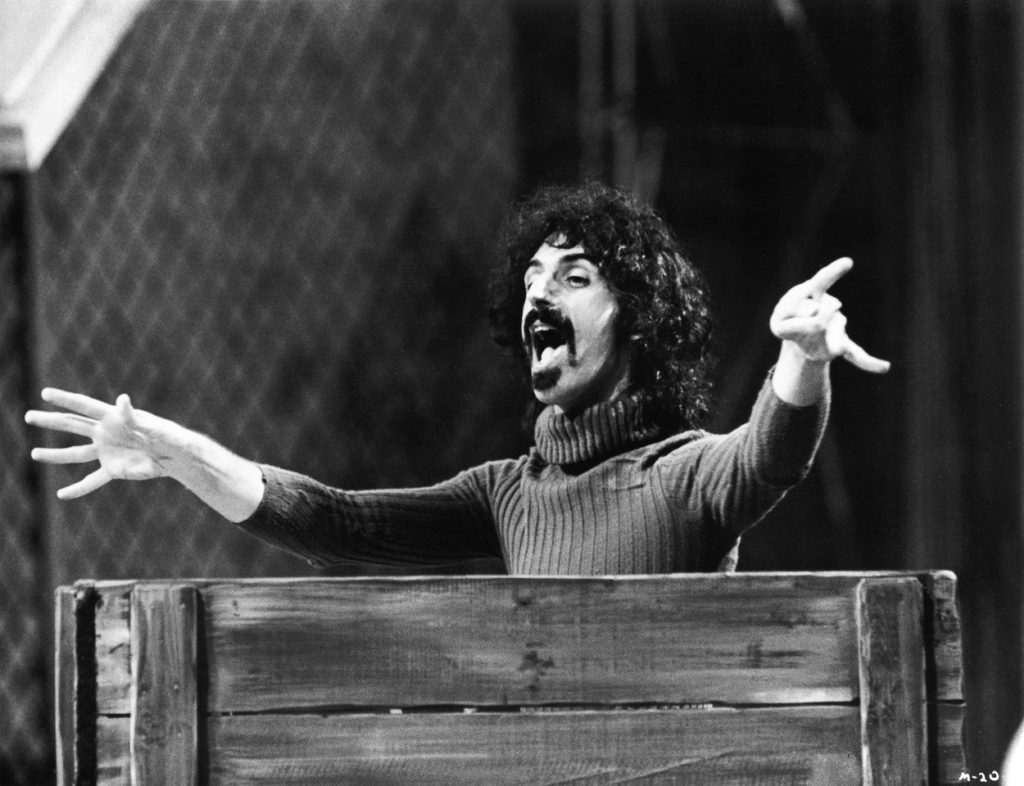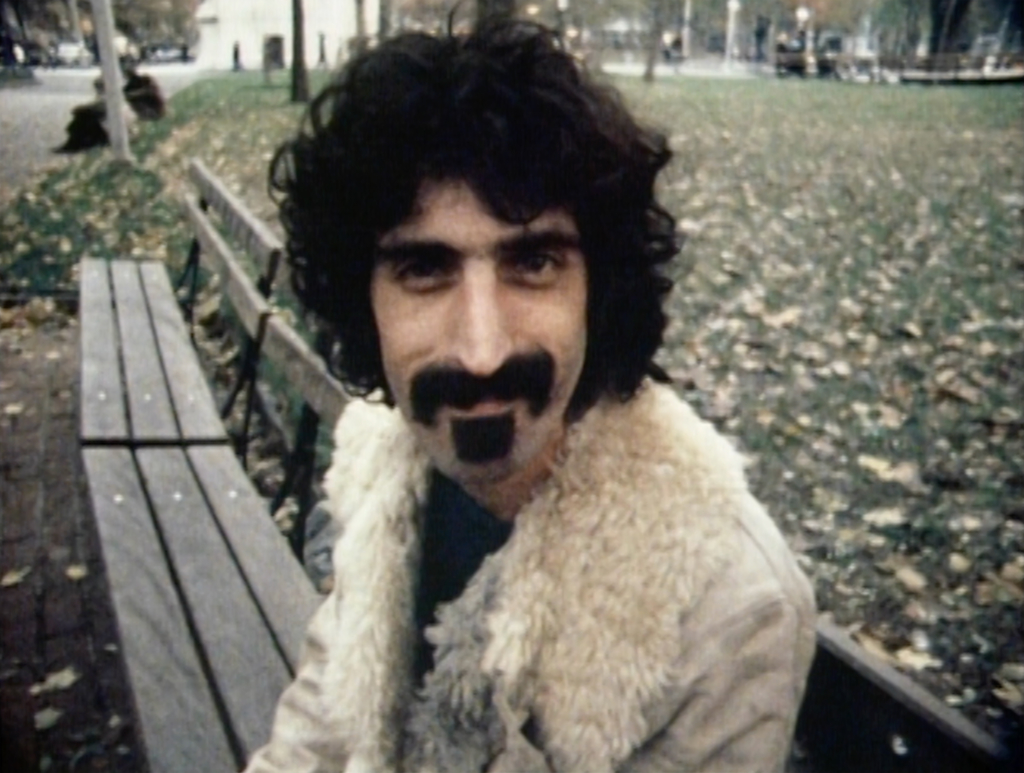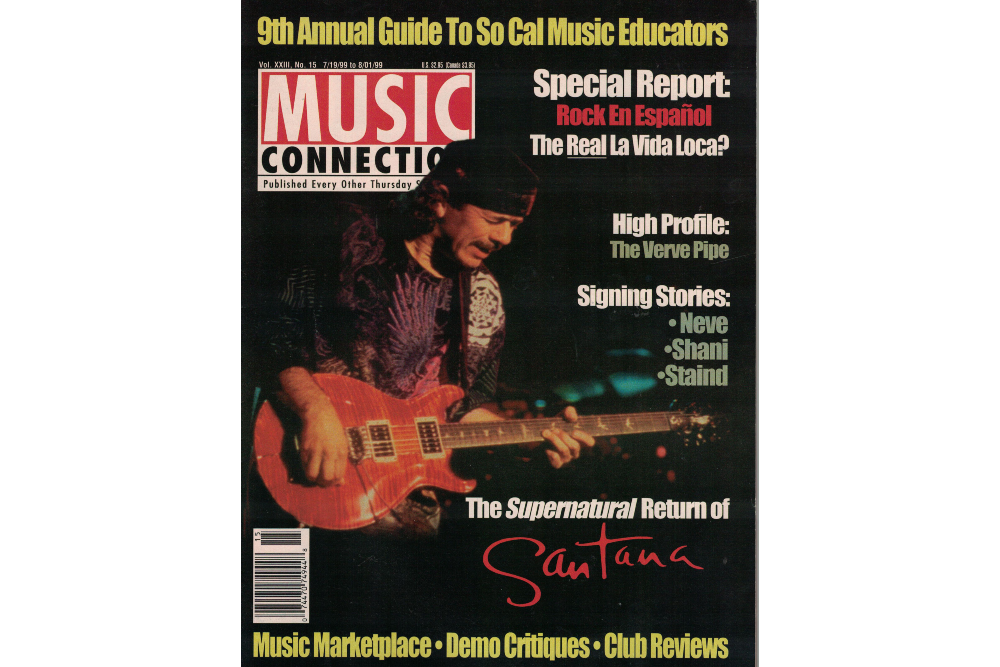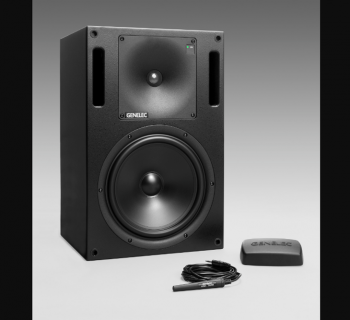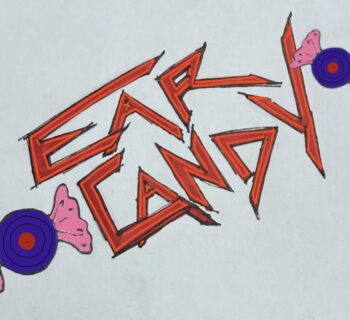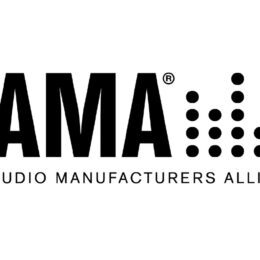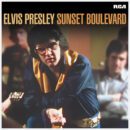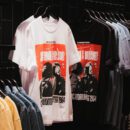Released in October 1971, Frank Zappa’s 200 Motels was a miraculous feat, a cinematic collision of the venerated musician and composer’s kaleidoscopic musical and visual worlds that brought together Zappa and his band, The Mothers, Ringo Starr as Zappa – as “a large dwarf” – Keith Moon as a perverted nun, Pamela Des Barres in her acting debut, noted thespian Theodore Bikel, the Royal Philharmonic Orchestra, and an incredible assortment of characters (both on screen and off) for a “surrealistic documentary” about the bizarre life of a touring musician. A heady, psychedelic stew of low and high brow art forms, the film, written by Zappa and co-directed by him and Tony Palmer, mixed together irreverent comedic skits, madcap satire, eye-popping animation and virtuosic on-screen musical performances from both The Mothers and the RPO for a fascinating and free-wheeling multimedia extravaganza.
Shot in just 10 days with a budget of around $650,000 from distributor United Artists, 200 Motels was one of the first movies to be filmed entirely on videotape and Zappa and crew pushed the envelope of the burgeoning new medium’s possibilities, mostly notably through its use of spectacular – and at the time – state-of-the-art visual effects.
Described by Laurel Canton-based Zappa as “at once a reportage of real events and an extrapolation of them… other elements include ‘conceptual by-products’ of the extrapolated ‘real event’ … In some ways the contents of the film are autobiographical,” 200 Motels was hailed by the Los Angeles Times as a “a stunning achievement” with “just the right touch of insanity,” and the “Zaniest piece of filmusical fantasy-comedy since the Beatles' A Hard Day's Night by Daily Variety.
The music, and its corresponding soundtrack, was equally diverse, a wild pastiche of avant-garde rock and orchestral compositions interspersed with dialog from the film. Up until that time, compositions like the finale piece, “Strictly Genteel,” were some of the most ambitious material ever written and recorded by Zappa.
The band in the film and on the soundtrack consisted of Frank Zappa (guitar & bass), Mark Volman (vocals & special material), Howard Kaylan (vocals & special material), Ian Underwood (keyboards & winds), Aynsley Dunbar (drums), George Duke (keyboards & trombone), Martin Lickert (bass), Jimmy Carl Black (vocals), and Ruth Underwood (orchestra drum set), not to mention the aforementioned Royal Philharmonic Orchestra.
In true Zappa fashion as he wrote in the album’s original liner notes, “This music is not in the same order as in the movie. Some of this music is in the movie. Some of this music is not in the movie. Some of the music that’s in the movie is not in the album. Some of the music that was written for the movie is not in the movie or the album. All of this music was written for the movie, over a period of 4 years. Most of it (60%) was written in motels while touring.”
In celebration of 200 Motels golden anniversary, Zappa Records, UMe and MGM have assembled a definitive Super Deluxe six-disc box set of the coveted, yet hard to find, soundtrack for release on November 19.
Fully authorized by the Zappa Trust and produced by Ahmet Zappa and Zappa Vaultmeister Joe Travers, the monstrous 200 Motels 50th Anniversary Edition brings together the original soundtrack, newly remastered by Bernie Grundman at Bernie Grundman Mastering, along with a staggering amount of unreleased and rare material unearthed from FZ’s Vault, including original demos, studio outtakes, work mixes, interviews and movie ads, along with newly discovered dialog reels, revealing an early audio edit of the film. Also included is a wealth of never-before-heard audio documentary material surrounding the project.
Discs 1 and 2 feature the remastered soundtrack with the second half of the second disc consisting of demos and demo outtakes; two of the many highlights from these sessions include unreleased alt mixes and alt takes of the Chunga’s Revenge tunes, “Road Ladies” and “Tell Me You Love Me.” Discs 3 and 4 contain the “Dialog Protection Reels,” which reveal an early version of the movie, while Disc 5 and 6 present unreleased outtakes, alternates and historical nuggets sequenced in the order of the original shooting script, the way Zappa originally envisioned before he ran into time and budget constraints. These illuminating discs reveal Zappa’s original intent for the film for the first time.
The six-disc set is housed in a 64-page hardcover book in a handsome 12” x 12” slipcase. The packaging replicates the original booklet updated with new liner notes from Pamela Des Barres, Ruth Underwood and Joe Travers, as well as Patrick Pending’s essay from the 1997 reissue, and is chock full of motion picture artwork, stills and images, from the film and its making, many which have never been seen before.
This collector’s release will also include a custom 200 Motels keychain and Do-No-Disturb motel door hanger and a full-size replica of the original movie poster. Years in the making, all the audio was meticulously identified and transferred over several years as Travers dug through the Vault to create a new high resolution 96K/24B digital patchwork stereo master from the original analog tapes. The Vault material was mastered by John Polito in 2021.
The remastered 200 Motels soundtrack will also be reissued on vinyl as a 2LP pressed on 180-gram black vinyl and also as a limited edition red vinyl pressing on 180-gram vinyl. They will be available exclusively on Zappa.com, uDiscoverMusic.com or Soundofinyl.com.
Both will be pressed by Optimal Media in Germany and be the first time the album has been available on vinyl in decades. The soundtrack will also be released on 2CD and all formats will include a smaller version of the movie poster. Additionally, the entire Super Deluxe Edition box set will be available digitally for streaming and download, marking the soundtrack’s digital debut, in both standard and hi-res audio. Pre-order for all configurations is available now.
Putting together this 50th anniversary edition was a labor intensive process that bore fruit at nearly every turn as Travers dug through Zappa’s expansive archives to put together this exhaustive edition.
As Travers writes in his liner notes, “During this search and seizure mission, I was able to unearth a multitude of audio treasures from a very large number of tapes. Original demos, session outtakes, alternate mixes and versions, and even dialog reels that captured an edit of the film that predates the final assembly which eventually made it to theaters everywhere in 1971.”
Amongst the gems discovered include a number of ¼-inch reel-to-reel tapes that were made at Trident Studios during February of ’71, which contain rough mixes of nearly everything that was recorded on multi-track.
As Travers explains, “they reflect raw performances, as they happened before FZ would get a hold of the multi-track masters and bring them to Whitney Studios in Glendale for over-dubs and sweetening. The Trident tapes allow us to hear music that did not make the film, or the final soundtrack album. They also helped us to reconstruct pieces of music like ‘The Pleated Gazelle’ or ‘What’s The Name Of Your Group?’ into their full sequences per the score. Over the years, even Frank himself forgot the sheer amount of music that actually did get recorded. All of the archiving for this 50th Anniversary set has produced incredible amounts of content that we would never had known existed otherwise.”
Last decade I interviewed Howard Kaylan and Mark Volman co-founders of the Turtles about their tenure with Frank Zappa.
Kaylan and Volman are spotlighted and heard on Zappa albums
Chunga's Revenge, 1971 Fillmore East, the soundtrack to 200 Motels, featured on Just Another Band from L.A. and three volumes of Zappa’s You Can't Do That on Stage Anymore. They also appear on Zappa’s 1992 endeavor, Playground Psychotics.
“We (Turtles) were thought of as a hit-making machine, but buried in there was a very thought-provoking group,” offered Mark Volman in 2013.
“We really cared about what was going on ... We were never really afforded the credibility of bands like the Byrds. We were making records that made it to the radio, but were still challenging and adventurous records. Experimental, but at the same time full of commerciality. The Turtles were really walking on a fine edge. We were only two years out of high school and we were making some pretty challenging music.”
After the Turtles disbanded at the end of the decade, Howard Kaylan and Mark Volman maintained their partnership, serving a five-album stint as members of Frank Zappa’s Mothers of Invention before releasing several albums as Flo and Eddie.
“I was a big fan of Frank early on. Howard and I were around the Freak Out recording sessions and we later saw Frank and the Mothers of Invention in New York City in 1967 when Frank and that band had a residency at the Garrick Theatre.
“We later saw his UCLA show and we were asked backstage. Frank then invited us that weekend to a barbecue at the Zappa’s house. We brought our families. Frank told us to bring our saxophones. He took us downstairs to the ‘dungeon of horror’ and played some music for Howard and me. He quickly saw that we were not sax players.
“He said, ‘Look, we’re going over to England for eight shows. How would you like to come along and sing?’ We also did some US shows and recorded with him for the first time a piece of music that came out on Chunga’s Revenge. We did some other songs in the studio with Frank including ‘Rudy Wants To Buy Yez A Drink’ and ‘Would You Go All The Way?’
“Frank was a Mother but we were Turtles, and he always wanted to know about our experiences. He thought we were stars. To him, the Turtles were like the Beatles. ‘What was that like?’ We told him a story about groupies; how these girls would do anything we wanted sexually if we would just sing ‘Happy Together’ for them. With that story began a two year relationship culminating in the motion picture, 200 Motels. Frank let us go through a litany of Los Angeles things that were in the live Fillmore East album. We were singing the praises of one of the greatest cities in the world. Like Frank, we were Los Angeles children. 200 Motels becomes the embodiment of our time with Frank. And we did Just Another Band From LA with him. After Chunga’s Revenge, we had what I used to call, ‘studio survival sessions,’ which is music he had recorded live and then we would work on it in the studio and clean it up. Some of those recordings were taped in concert. He recorded every show we did for over 2 years. Rehearsing with Frank was scary. He was the embodiment of a union man. There was never a time for fun. Putting together ‘Billy the Mountain’ was a series of vignettes that connected around a 43 minute opera.
“Howard and I usually started with Frank on guitar, the three of us, and we were given the music to learn. Frank felt most comfortable playing and singing the melody so there are very few times where Frank placed himself into the four-part harmony or three-part harmony. He kind of left that to Howard, Jim Pons, and me. We’d take the bit and show up at the rehearsal hall on Highland Avenue and lead the band through what he wanted.
“Once the British thing was over and we realized we were going full speed ahead, we went right back into the rehearsal hall and started prepping for a much longer segment European tour that took us all over the place. Mostly doing the stuff that would turn up on 1971 Live Fillmore East album. But a lot of the older stuff, the medleys Frank would make up. And it wasn’t just power, it was just a mastery.”
“Until Frank asked us to join him, the Turtles then had no interactions with Frank,” Howard Kaylan revealed in our 2009 interview. “The Turtles went one way and Frank went another. We were all fortunate to have work and didn’t question it.
“I maybe saw him once or twice socially at his place, or certainly at Martin Cohen’s house. We shared Martin Cohen as a lawyer and shared Herb Cohen in semi-management. In The Turtles days we were very friendly with Herb, even when Frank was out of town. And with Martin Cohen entering our lives, we would cross paths at least 2 or 3 times a year with Frank at Solstice parties at Martin’s house.
“So, we get free tickets to go to UCLA to see the Mothers of Invention, the original group, Because Frank hadn’t worked with these urchins for years, he was doing all this experimental jazz stuff. We didn’t know who the new guys were. I was following Zappas’ records.
“I worshipped We’re Only In It For The Money, one of the greatest rock records of all time. The cover art, too. It was better to me than the Beatles were at the time. There was a lot more content. A lot more undertone. A lot more sub-plot. A lot more ‘Wake Up America’ kind of thing.
“Whether it was real or imagined, I thought that Frank was the most brilliant writer that I had ever seen, socially, since Dylan. I loved the Beatles stuff, and not to take away from it, but this was new. I wore out copies of it. 8 tracks. I had it every place.
“So we go down to UCLA at Pauley Pavilion to see the reunion of this early Zappa first band with Roy Estrada, Ray Collins, Bunk and everybody new from the Garrick Theater days. And we loved it. Spectacular concert.
“We go backstage and shake everybody’s hand. Hugging all these guys we hadn’t see in years. And Frank says, ‘How ya doin’? I hear the Turtles broke up.’ ‘How did you hear that?’ ‘Hollywood is a very small town…’
“Lemme ask you a question. Do you guys know what you’re gonna do yet?’ Because, and he didn’t even give us a chance to answer, ‘’Cause I’m putting together a new bunch of Mothers and I want to go to Europe and I want to make a movie. What do you think?’
“We looked at each other in awe. Mark and I were so into that We’re Only In It For The Money album at the time we would have gone anywhere. We were flattered.’ ‘Tell you what. Let’s not make any decisions or hasty moves. I’m having a barbecue at my house on Sunday at 4:00. Bring your saxophones.’ He knew we played saxophones in the Cross Fires.
“So everyone is ordering burgers and Frank then motions us to go into his basement studio and has us whip out the saxophones. ‘OK. Play something.’ We hadn’t picked up these things in years. And Frank gets the gist rather quickly that he’s not dealing here with virtuosos. I think he had the thought that we could go out with a three- piece sax section and do some dissonant stuff, but the quality of our honking, I think, sort of made him have us put the saxophones away. But then, he had us sing along with a couple of things that had already been recorded. And we were on.
“He then asked us that day if we wanted to come with him for ten booked dates in Europe that would possibly lead to a movie. That he was going to be writing a movie as these dates were going on in Europe. He didn’t have a script yet bit he was going to call the thing 200 Motels.
“The most difficult part was the first day of rehearsal in Herb Cohen’s little complex on Sunset Blvd. We knew up front by jumping into this pond that anything creative that would come out of us would not be owned by us, a work for hire. It was a given. We were just thrilled for the work, let alone, mind you we were making a huge leap going from AM radio to this brand new medium FM radio that wouldn’t play us. We were discouraged from our Turtles’ history and we couldn’t use the name or references to ourselves.
“Working with Frank was great. It was easy. I suspected it was going to be difficult where he would be a very demanding in studio producer. In fact, he was pretty easy in the studio. It amazed me knowing the product he released in the past, and Chunga’s Revenge was already earmarked to be a Zappa solo record, it wasn’t a Mothers record.
“So we already knew we had some freedom because we weren’t Mothers of Invention at this point. We were just singing on a Zappa record. On some songs like ‘Sharleena,’ we were clearly the lead guys. And we upheld, I think, the spirit of the Mothers and what Frank was trying to do. Those voices were theatrical. They weren’t the Turtles’ voices.
“These are songs that keep us in the rehearsal hall every day for 10 hours for the 2 ½ weeks before this event. Most of the songs we knew obviously from being such huge fans. But just knowing a Mothers’ song doesn’t mean anything because Frank wanted to change it, the tempo or key. It was never the same two nights running, let alone two albums in a row.”
Howard and Mark returned to the UCLA venue as members of Zappa’s band, resulting in Just Another Band from L.A.
“I was a student there and had a radio show as a college deejay briefly,” recalled Kaylan.
“I had a full 4-year ride to UCLA. Then the Turtles happened. I used to walk past Pauley to get to class. On the school radio station, KLA, my program was called Afternoons With Howie the K. The songs I played were basically records I brought from home. The things they had at the station were basically just Top 40 crap. If they would play something around the Beatles’ Rubber Soul’ I would spin the b-side of The Swinging Blue Jeans record.
“As for the recording, there was improv on stage and between the cues of the things we had to say, you can even hear it on the record where it goes in and out, we were pretty much on out own.
“The stuff that we would say off script that would make Frank laugh, anything off book. That was the best feeling in the world. You can hear it in the recordings. Most of the stuff we did with Frank, including 200 Motels, was all done live. When you could make Frank laugh it was far better.
“As for the UCLA show, it wasn’t like I was returning triumphantly to the campus. It was just another show. ‘And little Howie Kaplan…’ I think I had deeper feelings for the shows we did at The Santa Monica Civic Auditorium. Because my parents were there and maybe the first and only time they had seen me not as a Turtle but as a Mother of Invention. It was great fun and a show I looked forward to every single night.”
Howard commented about going to England on that first trip with Zappa.
“I loved it. People were shocked when we showed up at The Bath Festival in front of hundreds of thousands of people and we were those guys. There was some advance PR, but even that was real skeptical.
“At the gig we’re at the side of the stage and we’re literally passing the shit around with the Who, Jefferson Airplane, Donovan, Yardbirds and just these unbelievable bands. And some of these guys we had known from The Turtles days. I’m watching the folklore take place that would later be turned into a script that later Frank would take credit for writing. (laughs). You know, and realizing, of course, that was part of the deal and that you were giving that stuff away.
“Once the British thing was over and realized we were going full speed ahead, we went right back into the rehearsal hall and we started prepping for a much longer segment European tour that took us all over the place. Mostly doing the stuff that would turn up on 1971 Live Fillmore East album. But a lot of the older stuff, the medleys Frank would make up. ‘Call Any Vegetable.’
“Frank would listen back to every show he recorded. I was kind of shocked that he went as far as using the song. But I’m glad they did, especially because that record came out at a funny time in relationship to 200 Motels.
“The 200 Motels movie was to have ended with ‘Happy Together.’ That whole business about the groupies, and where you staying out by the airport and all that stuff were to have taken place in a custom built car The Tinsel Cock car that was actually constructed on the Pinewood set. You can see that car in the featurette that Frank produced The True Story of 200 Motels. That really tells a much more complete story that you can ever read about that.”
Kaylan provides observations about working with Frank on stage.
“All I can tell you is that it was the best. It was like being on stage in some sort of dream- state half the time. Even when you weren’t thinking about your vocalizations, you couldn’t slide through a Mothers’ show, had to be on your toes 100 per cent, when you were on, then Frank was, or George was or Ian was or Aynsley (Dunbar) was. One of the greatest rock bands ever assembled.
“So you stood there as a performer. But when you stepped back out of the spotlight, you’re jaw hit the ground. Frank tops the list of all guitarists, from Jeff Beck to Jimmy Page on down. A lot of kids and musicians really need to hear Frank play guitar.
“Certainly once we joined the band I have no problem looking at Frank Zappa as a huge father figure in my life. I don’t think that anybody who ever worked with the man, instead of for the man, would say anything different. He was a very patient man and a saintly figure, even though he would hate that description. And certainly it only applies to morals that he set for himself. When it came to outside world morals Frank lived by a different code.”
Their stint with this Zappa-lead band unfortunately ended after an incident at the Rainbow Theater in London. That event had followed an earlier fire in Montreaux, Switzerland which burned the Mothers of Inventions’ equipment. A scene chronicled in Deep Purple’s “Smoke On The Water.”
Howard Kaylan had seen it all in the music business. But it’s pretty certain he hadn’t witnessed sort of horror before where at the Rainbow gig an audience member ran up and pushed Zappa off the stage and then he landed into the orchestra pit breaking his leg and rendering him unconscious.
“No man, we thought he was dead,” volunteered Kaylan. “That’s all there was too it. He was The Lodger. I’ve never seen a body that bent. I’m watching the violence and listening to the crowd. Kind of like one of those moments when the sound leaves you and it gets all hollow and it turns into slow motion. You’re not hearing anything except your heart beating and it sounds like you’re swimming. And that kind of bull shit. I wasn’t thinking at all. We were ushered off the stage by the people at the theater and we weren’t allowed to look into the pit as they took him away.
“And we didn’t hear from anybody for many weeks after. And we felt very guilty, because after the earlier Montreaux fire, Frank had wanted to go home. And it was only us day players, we the people in the band that got paid by the show, said, ‘Listen Frank. It’s easy for you to say. You’re making all the money off the records. And you can go home without the equipment. And that’s fine. But we’re canceling two weeks of shows in the United Kingdom, Ireland and Scotland. 14 shows that we’re missing, on account of the equipment. You have this bad feeling? Bull shit. Let’s press on.’
“Had we not borrowed equipment from the Who and Led Zeppelin to play that Rainbow Theater show we would have gone home. There wouldn’t have been a British tour. There wouldn’t have been any of these things and Frank wouldn’t have had this tragic accident and maybe the band would have continued on the way it was. I will never know.
“All I know is that when Frank was recuperating somebody had his ear so that when he came back to consciousness it was never a question the band would be back together again. There would be no band. He made that perfectly clear. I read it,” remembers Kaylan.
“I didn’t hear it from anyone. The next band would be Zappa. But Frank was going to be in a wheelchair for a year, that he was going more towards his jazz roots and not be so pop-oriented. We were brought in to be pop-oriented.”
Harvey Kubernik is the author of 20 books, including Canyon Of Dreams: The Magic And The Music Of Laurel Canyon and Turn Up The Radio! Rock, Pop, and Roll In Los Angeles 1956-1972. Sterling/Barnes and Noble in 2018 published Harvey and Kenneth Kubernik’s The Story Of The Band: From Big Pink To The Last Waltz. For November 23, 2021 the duo has written Jimi Hendrix: Voodoo Child for the publisher.
In 2015 Palazzo Editions published Harvey’s Leonard Cohen: Everybody Knows, and Neil Young, Heart of Gold published in 2016. Otherworld Cottage Industries in 2020 published Harvey’s book, Docs That Rock, Music That Matters. Kubernik’s writings are housed in book anthologies, most notably The Rolling Stone Book Of The Beats and Drinking With Bukowski. Harvey has written liner note booklets to the CD re-releases of Carole King’s Tapestry, Allen Ginsberg’s Kaddish, Elvis Presley The ’68 Comeback Special and the Ramones’ End of the Century.
During 2020 Harvey Kubernik served as a Consultant on the 2-part documentary television series Laurel Canyon: A Place in Time directed by Alison Ellwood.

